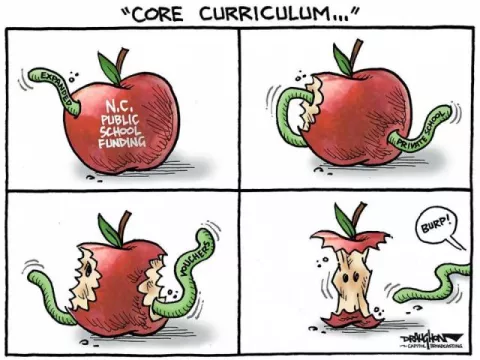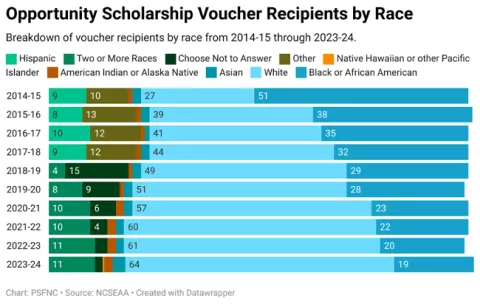NCAE believes that every child in North Carolina, no matter their race, income, or zip code, should have a high-quality education, an excellent teacher, and a great local school. However, private school vouchers stand in the way of that goal. Instead of helping to make local schools great schools, taxpayer funded private school vouchers take scarce resources from public schools where most of our kids learn and grow. Worse, they take away resources without any guarantee or evidence that they improve the academic performance of those students who take a voucher.

NCAE has called on the North Carolina General Assembly to pass a moratorium on private school vouchers. At present, there are insufficient safeguards to ensure the prudent use of taxpayer funds or the enhancement of student performance. NCAE calls for a halt on all voucher spending until a) additional safeguards and accountability measures are established, and b) public schools, where the majority of students are enrolled and educated, receive full funding to adequately address the needs of students, educators, and the communities they serve.
Why We Oppose Taxpayer-Funded Private School Vouchers
- Financial accountability, transparency and fraud. Public schools are required to be responsible with taxpayer dollars. Their budgets are transparent and open to audits. Decision-making adheres to open meeting and public record laws. However, private schools are not subject to the same standards of accountability and transparency as public schools. Even though vouchers send taxpayer dollars to these private institutions, there is little we can do to assess the fiscal management of taxpayer dollars or hold private governing bodies accountable.
- Student performance. Every child should have the freedom to pursue their dreams, and that requires a high-quality education for everyone. Therefore, every school must be equipped to deliver a quality education to every child. However, there is little data to suggest that students who take vouchers receive a better education. A 2017 study of North Carolina voucher students found inconclusive evidence of increased performance. Regardless of the performance of the 24,000 students with vouchers in 2023, the drain on resources negatively impacts the other 1,500,000 students in public schools.
- Teacher quality. Every student deserves a great teacher, but there are no licensure requirements for private schools. The public school system ensures there is a qualified teacher in every classroom, but to teach in a private school only a high school diploma is required. There is also no system for background checks for school employees.
-
Racial division. We believe schools should be a place where everyone feels welcome. But historically, and in practice, private schools are less diverse than public schools. White, Black or Brown, all our students learn more with a richer experience in diverse classrooms. Over North Carolina’s decade-long voucher history, we see the program has begun to contribute to the racial sorting of our school-aged children. In 2023-24, 64% of voucher recipients are white, while only 42.8% of North Carolina’s public school students are white. While non-white students make up the majority of our public schools, they now receive fewer than half of the private school vouchers.

- Cultural Diversity. Private schools can discriminate in admissions and hiring practices. There are examples of North Carolina schools that receive voucher money that deny students admission because their parents identify as LGBTQ or require specific religious beliefs. Public dollars should only go to institutions that are open to all.
- Academic accountability. Every student deserves a well-rounded curriculum that will nurture their imagination and freedom to learn. Yet private schools are not held to the same academic standards as public schools. In addition to curriculum standards, public schools are held accountable on a number of measures such as attendance, test scores, and graduation rates. Private schools do not take the same standardized tests as public schools, making academic comparisons impossible.
- Accessibility. Private schools don’t have the same requirements for accessibility as public schools. There is no requirement to provide transportation or a school lunch, for example. Private schools are also free to exclude students with disabilities like those served by Exception Children programs in public schools.
- Regional inequity. Our future depends on every child from every corner of North Carolina receiving a great education, but the voucher system has an inequitable impact on rural North Carolina. To start, smaller and more rural counties might not even have a private school or there are fewer, more distant options for those students. At the same time, vouchers take away resources from local school districts. In poorer districts with fewer schools, those losses are not so easily absorbed, and the impact of those losses are more keenly felt by all students.